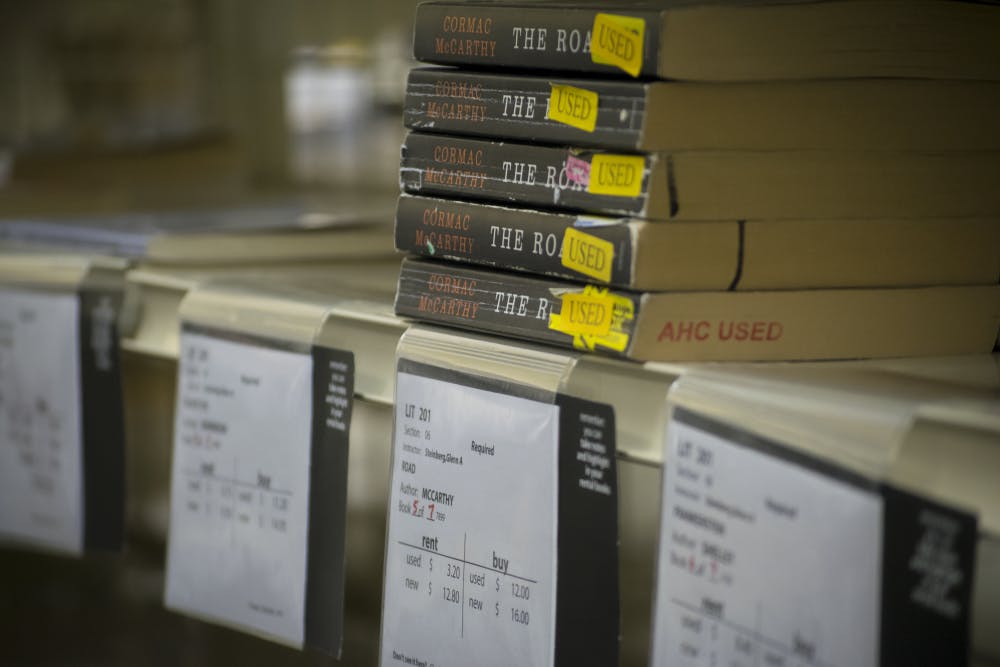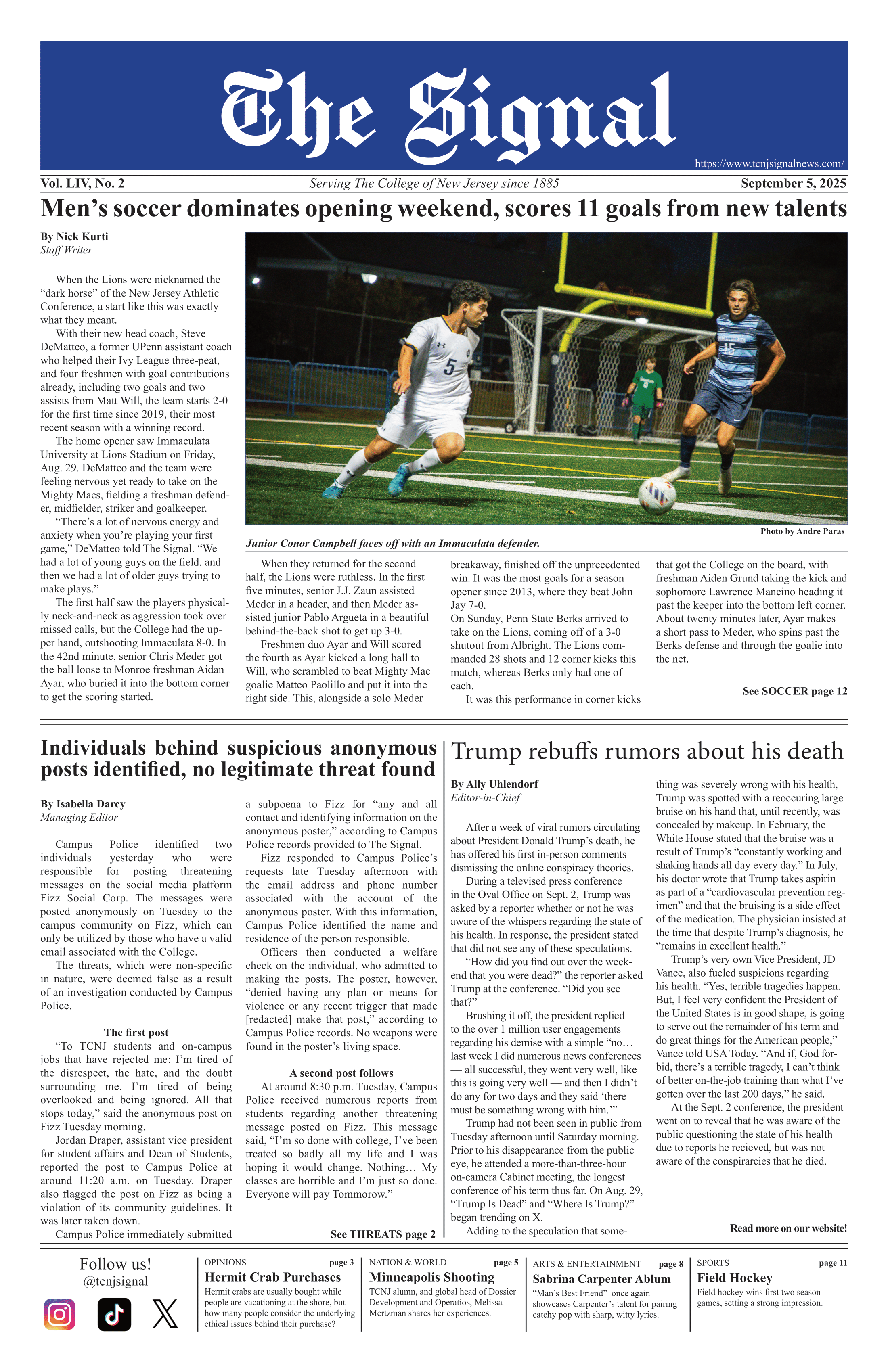By Alyssa Gautieri
Features Editor
You’re searching for the best price for your textbook, shuffling between the six different tabs on your laptop to find the best price. One tab displays your online bank summary, and it isn’t looking too hot.
What do you do?

It may seem like the easiest option is always the cheapest, but staff at the College’s bookstore, Barnes & Noble in Campus Town, would tell you otherwise.
Cristina Webster, assistant store manager, has heard some horror stories from students who have ordered from sketchy websites in search of the lowest price — including one who found drugs within their textbook’s package.
“When you buy from the bookstore, you know you’re getting the right book, and you know it won’t be ripped, damaged or missing an access code,” Webster said. “You know it will be exactly what you need for class.”
While the bookstore has always been convenient, it now has better prices, as well. This past year, the bookstore has upped its game by offering in-store price matches to Amazon and the Barnes & Nobles website.
“Obviously we have noticed that we have been losing sales because there were times when we just couldn’t compete with competitor prices,” alumna Kristin Linke (’04), the bookstore’s textbook manager since 2011, said. “But we want to keep the sales here, and price matching has helped us take back some of those lost sales.”
The Fall 2016 semester was the first time the bookstore offered price matching on new, used and rental textbooks, but most students did not take advantage of the opportunity until the spring.
“This semester, there was much more communication with students including email blasts and social media marketing,” Linke said.
Last semester, the bookstore sold approximately 25,000 books and only about 155 of those were price matches.
“I don’t have the exact numbers for this semester, but I know from dealing with customers in the store that we did a lot more price matches than last semester,” Linke said.
In order to be eligible for a price match, students must go to the bookstore prepared with proof of a lower price from either Amazon or the Barnes & Nobles website. The bookstore does not match third-party sellers.
“(Not being able to price match third-party sellers) is often misunderstood by students,” Linke said.
Third-party sellers are able to sell textbooks for extremely low prices because the deliveries are often being shipped internationally or sold by individual sellers. Third-party sellers do not guarantee a quality textbook and will often take longer to ship.
While the bookstore provides convenience and new lower prices, students are still looking for the cheapest price.
Despite this semester’s price match, some have still found cheaper options elsewhere.
“I usually shop at Chegg just because it is usually cheaper than the bookstore,” said Allison Vergano, a junior communication studies major.
Junior management major Christina Fabiano agreed.
“I don’t usually get my textbooks at the bookstore. My go-to is Amazon because it is usually cheaper,” she said. “While the bookstore is convenient because it on the way to and from class, I usually only shop there when they have sales.”
While the staff acknowledged the harsh costs of textbooks, Linke is frustrated by the stereotypes that the bookstore is out to get students.
“I think the bookstore gets a bad rap,” Linke said. “We will often hear students say that the bookstore is overpriced, but, unfortunately, we don’t set the prices. Instead, we try to implement programs, such as price matching, to help lower the costs for students because we know it is expensive, and we want to save them money.”
Webster agreed.
“We do all of this for the good of the school and its students, not for ourselves,” she said.
Apart from price matching, the bookstore has other alternatives for price-conscious students including renting and buying digital versions of the book.
“Money is tight for many people, and we know that some students are paying for their textbooks on their own, and we really are trying to come up with different ways to help students afford their textbooks,” Linke said.
Additionally, the College receives a portion of every sale made at the bookstore and a loss of sales has an impact on students at the College.
In a typical semester, the bookstore completes around 4,000 to 5,000 online textbook orders. Starting a month before classes begin, the staff shuffles through online orders, allowing students to quickly pick them up in store.
Typically the staff sorts through 250 to 300 online orders each day, but on one particularly busy day this semester, when the staff arrived at the store, they found more than 500 online orders in their queue.
“We walked in, and we were all really shocked,” Linke said. “Because of days like that, it definitely seems like we had more online orders this semester.”
According to Diego Ramirez, a bookstore staff member and a junior public health major, many students came to the bookstore with screenshots of competitor prices on their phones looking for better deals.
“We definitely received more traffic during our ‘rush weeks’ — the first couple of weeks before and during the semester — than expected,” he said. “We also saw a huge increase in people buying and renting textbooks this semester.”
While price matching allows the bookstore to compete with other outlets, it is also easier than buying online, according to Webster.
“Amazon orders can easily fall through. I’ve had students come to me and say, ‘Well, I ordered from Amazon, but the order was canceled, backordered, never came,’ etc.,” Webster said.
The bookstore is not only a reliable outlet, but it is convenient to those on campus. If a student realizes they need a book last minute, they can walk in, find their book and buy or rent it within minutes, as opposed to ordering online and having to wait or pay extra for shipping.
Dealing with a person face to face rather than a computer screen, easy returns and lower prices are just a few of the reasons students took their business to the bookstore this semester.
“(All the staff at the bookstore) are here to support students. We don’t want them to pay more. That is not our goal,” Linke said. “So, if they do find the book cheaper online, we want to be able to give them that pricing.”
Many students spend their hard-earned cash on textbooks each semester, spending anywhere from $100 to $500, or more, biannually.
“I personally love helping people find the best deals because, being a student myself, I, unfortunately, know the pain of having to shell out hundreds of dollars on textbooks for a single semester,” Ramirez said.







